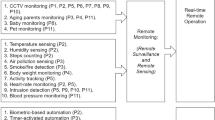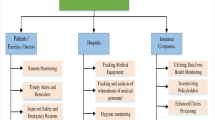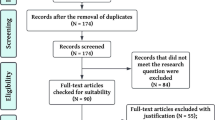Abstract
The widespread rises in chronic illnesses (e.g., diabetes and high blood pressure) have resulted in the need to find more efficient ways of managing patients with these conditions. One such way is by the use of mobile health (mHealth) technologies that can gather real-time data from patients and monitor them from a distance, removing the need to be at a medical facility. These technologies can be an integral part of intelligent healthcare environments (e.g., smart homes to monitor and assist elderly patients) which are essential to reducing healthcare costs and improving efficiency. The use of mHealth, however, brings various privacy concerns and challenges. This paper reviews and examines the challenges of preserving user privacy in the context of using mHealth to manage chronic diseases. The paper first discusses mHealth, its importance in managing chronic diseases, and the associated privacy concerns. Second, the paper compares the existing privacy frameworks applicable to mHealth. Third, the key principles gathered from the frameworks are analysed in the context of their suitability for enabling adequate privacy when using mHealth for managing chronic diseases. Finally, the paper argues that a new privacy framework is needed for mHealth in the context of managing chronic diseases.


Similar content being viewed by others
References
European Commission (2014) Green paper on mobile Health (“mHealth”). Brussels, 10 April 2014, COM(2014) 219 final
WHO (2011) mHealth—new horizons for health through mobile technologies, global observatory for eHealth series—Volume 3”. www.who.int/goe/publications/goe_mhealth_web.pdf. Accessed 15 Nov 2016
Estrin D, Sim I (2010) Open mHealth architecture: an engine for health care innovation. Science 330:759–760
Klonoff DC (2013) The current status of mHealth for diabetes: will it be the next big thing? J Diabetes Sci Technol 7:749–758
Augusto J, CallaghanV Kameas A, Cook D, Satoh I (2013) Intelligent environments: a manifesto. Human-Centric Computi Inf Sci. https://doi.org/10.1186/2192-1962-3-12
Martinez-Perez B, de la Torre-Diez, I, Lopez-Coronado M, Sainz-de-Abajo B, Robles M, and Garcia-Gomez J (2014) Mobile clinical decision support systems and applications: a literature and commercial review. J Med Syst. https://doi.org/10.1007/s10916-013-0004-y
Grindrod K, Boersema J, Waked K, Smith V, Yang J, Gebotys C (2017) Locking it down: the privacy and security of mobile medication apps. Can Pharm J/ Revue Des Pharmaciens Du Canada 150(1):60–66. https://doi.org/10.1177/1715163516680226
Karim (2014) ICT: wearable technology—KARIM foresight report. INTERREG IV B—207G, France. http://www.karimnetwork.com/wp-content/uploads/2014/11/Wearable-Technology-Final_November2014.pdf. Accessed 03 Jul 2017
GSMA (2017) The mobile economy 2017. https://www.gsma.com/mobileeconomy/. Accessed 03 Jul 2017
Becker S, Miron-Shatz T, Schumacher N, Krocza J, Diamantidis C, Albrecht U (2014) mHealth 2.0: experiences, possibilities, and perspectives. JMIR mHealth uHealth 2:24
Malvey DM, Slovensky DJ (2014) mHealth: transforming healthcare. Springer, New York
Conroy MK (2015) Connecting patients to mHealth apps to enhance self-care management. Home Healthc Now 33:437
Saleem S, Ullah S, Kwak K (2011) A study of IEEE 802.15.4 security framework for wireless body area networks. Sensors 11(2):1383–1395. https://doi.org/10.3390/s110201383
Varshney U (2014) A model for improving quality of decisions in mobile health. Decis Support Syst 62:66–77. https://doi.org/10.1016/j.dss.2014.03.005
Tmar-Ben Hamida S, Ben Hamida E, Ahmed B (2015) A new mHealth communication framework for use in wearable WBANs and mobile technologies. Sensors 15(2):3379–3408. https://doi.org/10.3390/s150203379
Albuquerque SL, Gondim PRL (2016) Security in cloud-computing-based mobile health. IT Prof 18(3):37–44. https://doi.org/10.1109/MITP.2016.51
Kemp R, Moore AD (2007) Privacy. Lib Hi Tech 25:58–78
Solove DJ (2006) A taxonomy of privacy. Univ Pa Law Rev 154:477–560
Araujo I (2005) Privacy mechanisms supporting the building of trust in e-commerce. 21st International Conference on Data Engineering Workshops. https://doi.org/10.1109/ICDE.2005.263
European Union (1995) Directive 95/46/EC of the European parliament and of the council on the protection of individuals with regard to the processing of personal data and on the free movement of such data. http://www.refworld.org/docid/3ddcc1c74.html. Accessed 17 Oct 2017
IAPP Information Privacy Centre (2011) Glossary of common privacy terminology. https://iapp.org/media/pdf/certification/CIPP_Glossary_0211updated.pdf. Accessed 07 Jul 2017
Organization for Economic Cooperation and Development (2013) OECD privacy principles. https://www.oecd.org/sti/ieconomy/oecd_privacy_framework.pdf. Accessed 03 Apr 2017
Office of the National Coordinator for Health Information Technology (2008) Nationwide privacy and security framework for electronic exchange of individually identifiable health information. https://www.healthit.gov/sites/default/files/nationwide-ps-framework-5.pdf. Accessed 07 Apr 2017
Carew PJ, Stapleton L (2005) Towards a privacy framework for information systems development. Springer, US, Boston, MA, pp 77–88
Carew PJ, Stapleton L (2005) Privacy, patients and healthcare workers: a critical analysis of large scale, integrated manufacturing information systems reapplied in health. 16th IFAC World Congr 38:1–6
Health Privacy Project (2007) Summary of HPP best principles. https://www.slhd.nsw.gov.au/pdfs/Summary_of_HPPs.pdf. Accessed 05 Jul 2017
Kotz D, Avancha S, Baxi A (2009) A privacy framework for mobile health and home-care systems, first ACM workshop on security and privacy in medical and home-care systems 11:1–12. https://doi.org/10.1145/1655084.1655086
Avancha S, Baxi A, Kotz D (2012) Privacy in mobile technology for personal healthcare. ACM Comput Surv (CSUR) 45:1–54
Markle (2010) Connecting for health common framework for health information exchange. https://www.markle.org/publications/274-connecting-health-common-framework-health-information-exchange. Accessed 15 Nov 2016
Prosch M (2008) Protecting personal information using generally accepted privacy principles (GAPP) and continuous control monitoring to enhance corporate governance. Int J Discl Gov 5:153–166
Nordgren A, Institutionen för kultur och kommunikation, Linköpings universitet, Filosofiska fakulteten and Centrum för tillämpad etik (2015) Privacy by design in personal health monitoring. Health Care Anal 23(2):148–164
ENISA (2017) Privacy by design. https://www.enisa.europa.eu/topics/data-protection/privacy-by-design. Accessed 09 Jul 2017
ENISA (2014) Privacy and data protection by design—from policy to engineering. https://www.enisa.europa.eu/publications/privacy-and-data-protection-by-design/at_download/fullReport. Accessed 10 Jul 2017
Everson E (2016) Privacy by design: taking ctrl of big data. Clevel State Law Rev 65:27
Cavoukian A (2010) Privacy by design: the definitive workshop. A foreword by Ann Cavoukian, Ph.D. Springer, New York. https://doi.org/10.1007/s12394-010-0062-y
European Commission (2016) Privacy code of conduct on mobile health apps. https://ec.europa.eu/digital-single-market/en/privacy-code-conduct-mobile-health-apps. Accessed 17 Oct 2017
Clemence B, Walkinshaw ZV, Mulryne J, Dickinson R (2017) WP29 Reviews the European draft code of conduct on privacy for mobile health apps. http://www.digitalhealthdownload.com/2017/05/wp29-reviews-european-draft-code-conduct-privacy-mobile-health-apps/. Accessed 17 Oct 2017
Ackerman L (2013) Mobile health and fitness apps and information privacy. Privacy Rights Clearing House. https://www.privacyrights.org/sites/default/files/mobile-medical-appsprivacy-consumer-report.pdf. Accessed 29 Oct 2017
McCarthy M (2013) Experts warn on data security in health and fitness apps. BMJ Br Med J 347(1):f5600. https://doi.org/10.1136/bmj.f5600
Steinhubl SR, Muse ED and Topol EJ (2015) The emerging field of mobile health. Sci Transl Med 7(283):283rv3. https://doi.org/10.1126/scitranslmed.aaa3487
Arora S, Yttri J, Nilse W (2014) Privacy and security in mobile health (mHealth) research. Alcohol Res Curr Rev 36:143–151
Harvey MJ, Harvey MG (2014) Privacy and security issues for mobile health platforms. J Assoc Inf Sci Technol 65:1305–1318
Brey P (2005) Freedom and privacy in ambient intelligence. Ethics Inf Technol 7:157–166
Shilton K (2009) Four billion little brothers?: privacy, mobile phones, and ubiquitous data collection. ACM, New York
European Commission (2011) Advice paper on special categories of data (“sensitive data”). http://ec.europa.eu/justice/policies/privacy/docs/wpdocs/others/2011_04_20_letter_artwp_mme_le_bail_directive_9546ec_annex1_en.pdf. Accessed 15 Jul 2017
Krent HJ, Gingo N, Kapp M, Moran R, Neal M, Paulas M, Puneet S, Suma S (2008) Whose business is your pancreas? Potential privacy problems in New York City’s mandatory diabetes registry. Ann Health Law 17(1):1
Author information
Authors and Affiliations
Corresponding author
Rights and permissions
About this article
Cite this article
Jusob, F.R., George, C. & Mapp, G. Exploring the need for a suitable privacy framework for mHealth when managing chronic diseases. J Reliable Intell Environ 3, 243–256 (2017). https://doi.org/10.1007/s40860-017-0049-7
Received:
Accepted:
Published:
Issue Date:
DOI: https://doi.org/10.1007/s40860-017-0049-7




